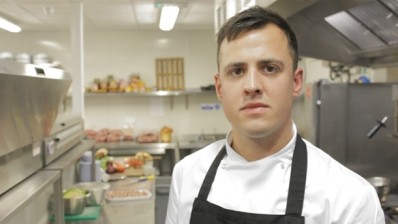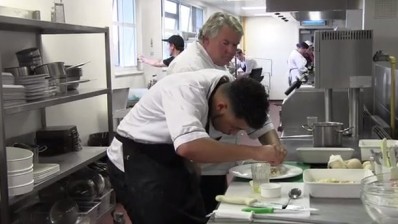VIEWPOINT
Goodwood Estate's Darron Bunn on why hospitality businesses have a duty to invest in future talent

What does a group executive chef do at Goodwood Estate?:
My role is to oversee quality, standards, training, environment and to look at our suppliers in all our food businesses at Goodwood. We have good head chefs and senior head chefs in each area and they all run their businesses individually, but we do all try and work together. Day-to-day the outlets run themselves, so operationally I have little input, but we are all on the same estate so there are similarities in the way things are run.
The areas of the business are all different, but whether a chef is making a full English breakfast for the Festival of Speed or a three-course meal in one of our restaurants the standard must be the same and it’s my job to ensure that is upheld. It’s also my job to make them aware of what’s going on around the business so they don’t get stuck in their silos.
Goodwood set up a Chef Academy two years' ago, what was the reason for that?
It came about in two ways - Chichester College [Goodwood Estate's partner college] wanted to encourage more people to come to their college by showing that there are a whole range of things they can do on the course and that it's not just about spending five days a week at college, so they looked at us to give some on-the-job training. From Goodwood's point of view, investing in talent and giving students the chance to do that is the sort of thing, as a big business, we should be doing.
I think we have a sense of duty to encourage people into our industry and at the same time there is a lack of talent around. We have a duty as a large food business to help nurture talent, but having an academy also helps us in that hopefully we get a young person, train them and they fall in love with Goodwood and want to stick around for a while. We create those habits from the word go rather than training them on the job. For the last three years we've taken on one recruit each year and our first has just been promoted. It just seemed like a good idea.
Working with the college also allows us to get the word out there about what cheffing is about. People always complain about the colleges not equipping students with the right skills, but I think we need to get off our soap boxes and do something rather than moaning about it.
Do you see the Chef Academy as a way of addressing the industry's chef shortage?
It's never going to have a massive impact and it’s never going to be the answer to filling that void because the biggest gap for chefs is at that secondary level of demi chef de partie and and chef de partie level.
I think the academy is just part of the way we can address it. As employers we need to recognise that the industry has changed and we need to move with that by looking at making changes to work hours. Working in the kitchen t is a lifestyle choice and there will be unsociable hours people will have to work in, but like some places have done, we’re looking at reducing hours and bringing in a four-day working week to make it more appealing.
The industry is more professional than it used to be and I think that's what people are looking for. They want to have a life and be a chef and I think there is more chance of doing that now.
What future plans to do you have for the Chef Academy?
We definitely need to grow it. The team all agree that the academy is a great thing, but it needs to be more beneficial to us. We are going to expand the in-take so we’ll take up to two or three apprentices a year instead of one. We are also changing the structure so that in the first year a recruit will spend two or three months stints in each area of the business while doing a day a week at college. In the second year they choose where they want to spend their four days in the business.
We’ve just taken on two bakers as we’re going to start a Goodwood Bakery to make our own bread and pastries so it could be that they end up working there in their second year. There's so much scope here with all the different areas of the business that it's just a great opportunity for them to try different areas in one place.


















